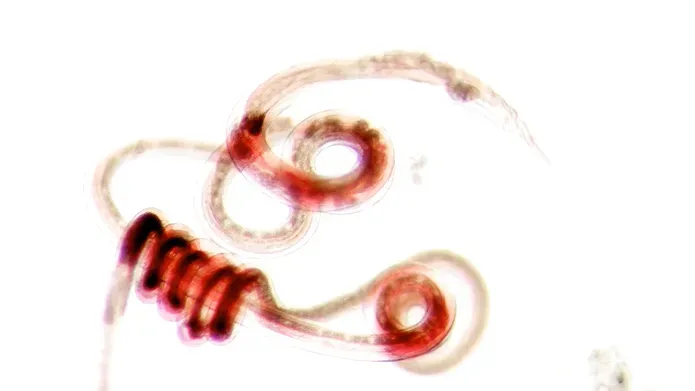Press release
Dundee research turns the worm’s weapons against them
University of Dundee experts have made a crucial scientific breakthrough that could herald the development of vaccines against parasitic worms.
Published on 18 July 2025


A stunted worm that has been treated with the vaccine. Credit - University of Dundee
Experts at the University’s School of Life Sciences have developed a means of protecting hosts against parasitic worms, paving the way for further research that could prevent millions of infections of humans, livestock and pets every year.
The Dundee team found that parasitic worms produce proteins – including two known as HpARI and HpBARI – which suppress the host immune response. These proteins effectively block the immune system from reacting to the worm, allowing the infection to become chronic, resulting in long-term problems. Once infected, human hosts can experience diarrhoea, nausea, vomiting, and abdominal pains. Children are particularly vulnerable to the effects of worm infection, with an increased risk of growth stunting and malnutrition.
The Dundee team have discovered that they can turn these weapons against the parasite by vaccinating mice with HpARI and HpBARI. This raises an immune response that can be directed against these proteins, blocking their effects. This nullifies the parasite and allows the host’s immune system to effectively clear the infection. It is hoped that these findings, published in the journal Cell Reports, can be translated from the mouse models to other animals and humans.
As well as infecting humans, parasitic worms commonly infect livestock and pets. The impact of infection can be significant on its host, with parasitic worm infection costing the European livestock sector €1.8 billion every year. Despite the significant health and economic impact of infection, there is currently no vaccination for humans against parasitic worms, with limited progress in protecting animals.
Scientists have long-known that to protect themselves, parasitic worms suppress the immune system of their hosts, however the molecular basis of this is only now becoming clear. As well as being useful as vaccines, parasite proteins such as HpARI and HpBARI have received interest as potential new treatments for human diseases where the immune system is hyperactive, for instance in allergies and asthma.
Dr Henry McSorley, lead author in the division of Cell Signalling and Immunology at Dundee’s School of Life Sciences, said, “Parasitic worms bring illness and misery to millions of people, often in some of the world’s poorest countries.
“Our work has revealed that HpARI or HpBARI proteins are effective in mitigating the effects of infection in hosts. Further research will be required to identify similar proteins from parasites of humans and livestock. These results are incredibly positive and could form the basis of a future vaccination that could protect humans against worm infection.
“There is still plenty of work to do, but in our battle against parasitic worms, the worm is beginning to turn.”